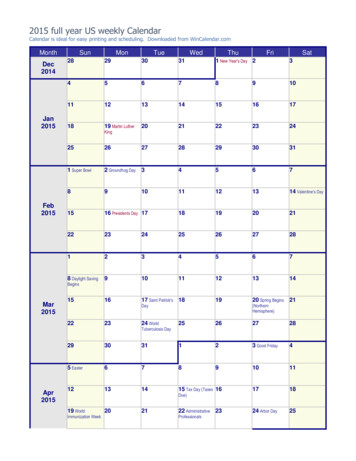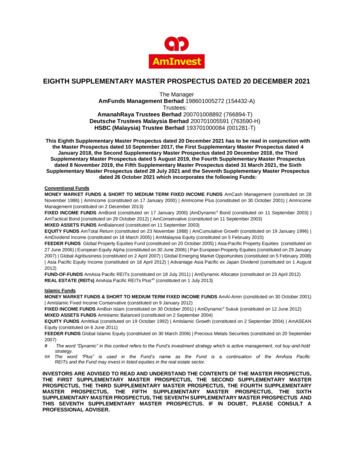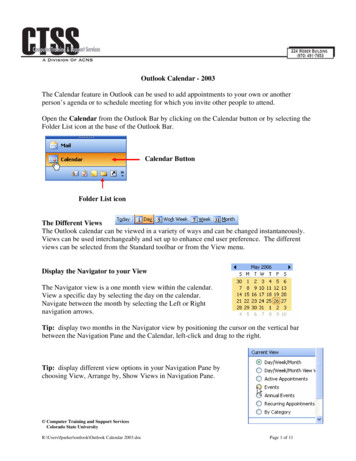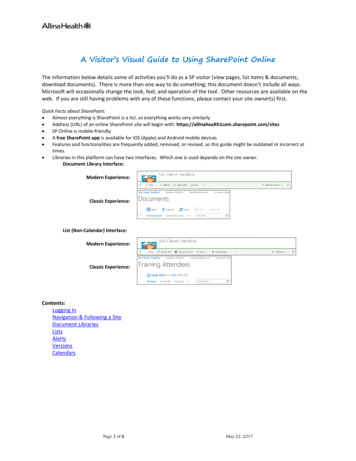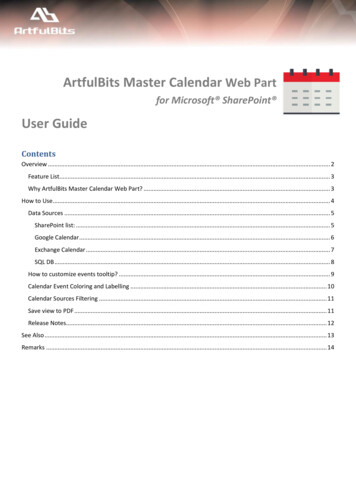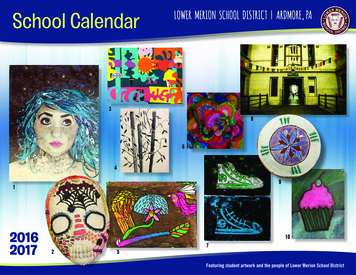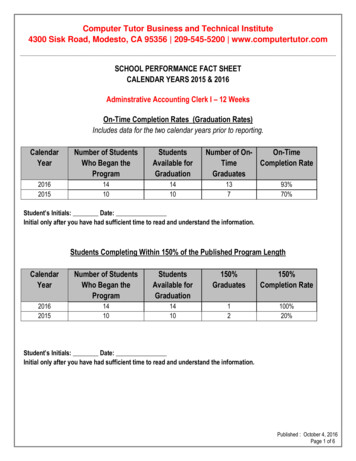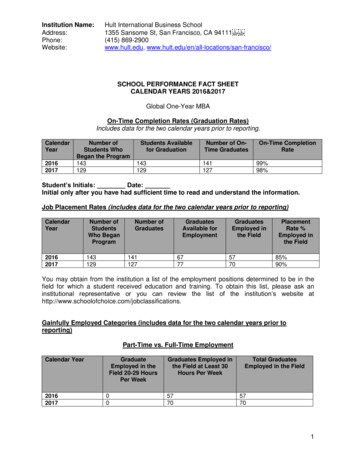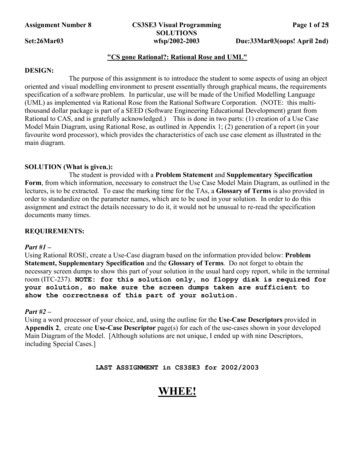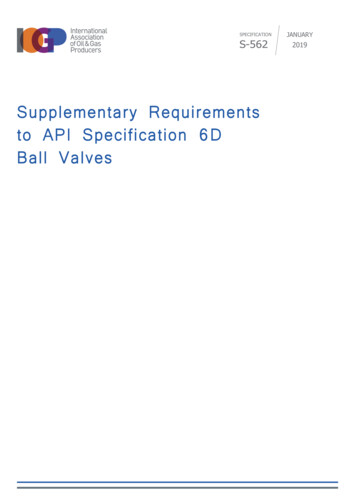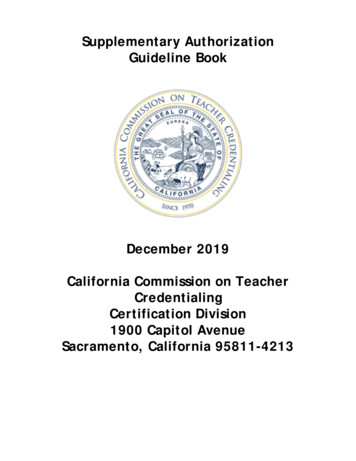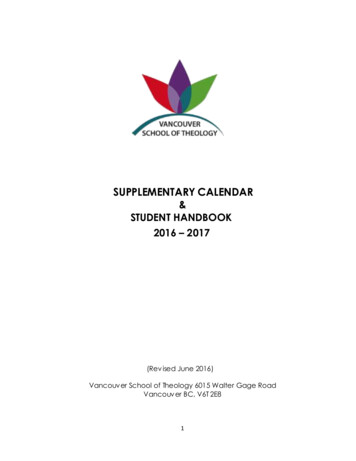
Transcription
SUPPLEMENTARY CALENDAR&STUDENT HANDBOOK2016 – 2017(Rev ised June 2016)Vancouv er School of Theology 6015 Walter Gage RoadVancouv er BC, V6T 2E81
Table of ContentsNew Course DescriptionsNew PoliciesVST Student Dates Calendar: 2016-17Culminating Assignments: Deadlines and GuidelinesA. General Community and Administrative Policies1. VST’s Theological, Educational, Curricular and Communal Commitments2. Student Responsibilities3. Inclusivity4. Language of Worship/Words we Choose5. VST Anti-Harassment Policy6. Privacy Policy7. Disability Resources8. Scent– Free Community Policy9. Appropriate and Responsible Use of Information Technology & Social MediaB. Signposts for our Life TogetherC. Registration and Financial Obligations1. Registration Guidelines2. Student Categories and Program Status14716-17181818181919192020212222i) Certificate Studentii) Degree/Diploma Studentiii) Unclassified Studentiv) Auditing Studentv) Full Load and Full time Statusvi) Writing a Thesis and full-time statusvii) CPE and full-time statusviii) Active Program Statusix) Inactive Program Status3. Accounting Office Policies4. Transfer Policies and Locating Guidelines5. Registration in Special Programs and Courses242526i) Denominational Studiesii) Directed Studies: Policies and Proceduresiii) Academic Credit for Co-Sponsored Conferences & Events6. Distance Education and Off-Site Programming27i) Residential Requirementsii) Community Building and Orientation Weekiii) Library Useiv) Off-Site Course Policies7. Degree Program Changes8. Course Records and TranscriptsD. Tuition and Fee Structure1. Tuition fees2. Academic Fees3. Student Fees4. Fee Refunds and Withdrawals5. Withdrawal and Student Loans282930303031322
E. Written Work, Course Assignments, Evaluations, Due Dates and Remedial Work1. Academic Guidelines for Assignments33i) VST Citation Stylesii) List of Biblical Abbreviationsiii) Plagiarismiv) Assignment Due Datesv) Late Assignmentsvi) Grading and Return of Workvii) Not Approved (NAPP) Assignmentsviii) NAPP Paper Appeals Process2. Academic Guidelines for Courses35i) Guidelines for course workii) Guidelines for VST Intensivesiii) Recording in Classiv) Social Media in Classv) Attendancevi) Final Examinationsviii) Assignment and Course Evaluation3. Grades and Grading Policies38i) Grading Policy at VSTii) VST Letter Grade Scaleiii) Narrative Commentsiv) NAPP Final Grade Appeal Processv) Course Recordsvi) Missing Evaluations4. Research Policies40i) VST Guidelines for Ethical Researchii) Research with Human Subjects5. Academic Support43i) Research Modulesii) Editorial Help6. Course, Teaching & Program EvaluationsF. Academic Performance and Student Conduct1. Students’ Progress Review; Faculty Student Review Committee (FSRC)2. Student Code of Conduct Guidelines3. Disqualifying Patterns of Behaviour4. Probation5. Required Withdrawal6. Satisfactory Academic Progress and Student Loans7. Satisfactory Academic Progress and VST BursariesG. Readiness for Ministry Policy and GuidelinesH. MDiv Program Guidelines1. Readiness For Ministry Guidelines for MDiv Students2. Police Record Check3. Course Requirements for the Master of Divinity Degree4. Field Education at VST5. Major Exegetical Paper6. Integrative Ministry Paper and Interview7. Master of Divinity (Honours) with Concentration in.(M. Div. Honours)8. Protocols for NMP Students in Residency9. Determination of MDiv 3
I. MA PPL Program Guidelines1. Readiness for Ministry Guidelines for MA PPL Students2. Police Record Check3. Course Requirements4. MA PPL Capstone Project and Presentation5. MA PPL Specialization in Spiritual CareJ. MATS Program Guidelines1. Course Requirements2. MATS Comprehensive Exam Guidelines3. MATS Thesis GuidelinesK. MA IIS Program Guidelines1. Course Requirements2. Competencies for MA IIS3. Supervised Field Experience for MA IIS4. MA IIS Directed Study Guidelines and Oral Presentation5. MA IIS Thesis OptionL. ThM Program Guidelines1. Coursework2. Thesis and ProjectM. Continuing Education Certificate Guidelines1. Certificate Concentrations2. Transfer into a VST Diploma or Degree Program3. Transfer of external coursework4. Certificate Coursework expectationsN. Student Support1. Employment at VST2. Overnight Accommodation for VST Students3. Academic Advising4. Covenant Groups at VST5. Chaplaincy at VST6. Emergency FundO. Student Financial Aid1. VST Student Financial Aid Policy2. Work/Study Program3. Funding for course re-takes4. Applicants on Probation5. Thank-you Notes6. Federal and Provincial Government Loans7. U.S. Student Loans8. Satisfactory Academic Progress9. Continuing Education Bursaries10. H.R. MacMillan Policy for ClergyP. Worship at VST1. Principals and Values2. Guidelines3. Language of Worship/Words we Choose4. Eucharist/Communion5. 71717172727373747474747575757576767676764
6. Guidelines for Use of the Epiphany ChapelQ. Finding Things at VST1. VST Reception Desk2. Student Paper Submission & Pick Up3. Office Locations4. Student Lounges5. Classrooms6. Leaving Messages7. Room Bookings8. Computers9. ParkingR. VST Structure1. Board of Governors2. Principals Council (PC)3. Dean’s Advisory Council (DAC)4. Faculty Council5. Public and Pastoral Leadership Committee (PPL)6. Research Studies Committee (RSC)7. Bursary Committee8. Admissions and Scholarship Committee9. Other Associations and Committees77787878787878787878797979797979798080i) Faculty Associationii) Denominational Communitiesiii) Staff Associationiv) VST Alumni Associationv) Worship & Spiritual Life Committeevi) VST Students’ Association (VSTSA)S. Community Events1. Orientation Week2. Community Soup and Bun Lunches3. Research Colloquia4. Workshops5. Parties and Socials6. The Somerville Community Event and Public Lectures7. The G. Peter Kaye Lectures8. ConvocationT. UBC Campus and Beyond1. Public Worship2. Public Transit3. UBC Resources and Information81818181818181818282825
New Course DescriptionsVST Course Numbering System100’s: Non– degree courses/workshops/lectures500’s: Degree program courses without prerequisites600’s: Degree program courses with prerequisites700’s: Basic/Advanced Courses800’s: Advanced degree seminars onlyIndigenous & Inter– ReligiousProgram Numbering SystemIPC – Culture (Sacred Texts & Culture)IPH – HistoryIPS – Spirituality (Spirituality, Practice, Ritual)IPT – Thought (Thought, Philosophy, Theology)IPI – IntegratedVST course prefixSAH prefix: taught by S t. A ndre w’s Hall facultyBIBL:Biblical LanguageED:Educational MinistriesHB:Hebrew BibleHIS:Historical StudiesHOM:HomileticsINT:Integrated StudiesLS:Liturgical StudiesNT:New TestamentPT:Pastoral l Studies*Note: Course Descriptions for courses previously held at VST can be found in the ‘Course Description’ section of the2016– 2017 Academic Calendar on VST’s website. The course descriptions below are only those that are not otherwiseavailable.NEW FALL TERM 2016 COURSES:LS502a – Anglican Vocation: Retreat – Rev. Grant RodgersThis brief retreat, conducted during Orientation Week, will especially engage incoming but also ongoing students inthe Anglican ministry stream to reflect upon and share their own unique understanding of calling and where they seethat calling taking them. Senior students may be able to offer deeper insight into to new students about pursuing theirsense of calling in the seminary milieu.SAH-PT5/720 – The World Wide Christian Movement Today – Rev. Dr. Bob PaulJust over a century ago, the unquestioned center of world Christianity was the North Atlantic nations of Europe andNorth America. By the end of the century, however, the Church had significantly declined in the North Atlantic, andhistoric Christendom was all but gone. At the same time, surprisingly and in sharp contrast, the Christian movementhad grown dramatically in the global South, most notably in the former ‘mission fields’ of Africa, Asia, and LatinAmerica. This course presents an alternative to traditional Euro-centric histories of the Church by surveying thehistoric dynamics of the Christian movement, the burgeoning growth of the past century, and issues that impinge onthe post-Christendom Western churches in light of recognizing the Christian movement as a highly diverse, multicultural, worldwide phenomenon.TH6/700 – Christology – Rev. Ray AldredThe centre of Christian theology is Jesus Christ. Therefore, this course will focus on thinking through the scriptural andecclesiastical traditions concerning the person and work of Christ. This will provide the basis for a discussion about theimplication of Christology for the present and future Church. Thus, the course will seek to engage the ideas representedby the councils, creeds of past theologians, and then move to examine the theological praxis that resulted in a colonialand post-colonial context. Indigenous thought will be a key component in the teaching. All this in hopes of the learnerdeveloping a shared praxis based upon a renewed Christology. Pre-requisite: TH5001
NT/HOM6/750 – From Text to Life: The New Testament and what we do with it – Rev. Dr. Jason ByasseeAcademic study of the bible and the health of local churches and ministries are often frustratingly alien to one another.But surely how we study the bible and how we practice our faith ought to be intertwined. This seminar will attend tothe work of St. Paul and current scholarship on the apostle alongside local ministries in Vancouver and how these areinspired (or not!) by the NT epistle writer. The questions we ask and debate have as their purpose imagining how ourown scholarship and ministries will intertwine. Pre-requisite: HOM500 and/or NT501TH857 – Radical Relationality for a New Theological Paradigm – Dr. Sallie McFagueThe purpose of this course, put most simply, is why individualism may be a bankrupt model for imagining relationsbetween God and the world and why we need a new paradigm. The individualistic, anthropocentric Western paradigmis killing our planet and increasing financial inequality. In this course, we will look at and try to internalize variousforms of relationality as the basis for different models of God and the world more suited to 21st century planetaryexistence for human beings and other forms of life. The three types of relationality for our study will be insights fromquantum and evolutionary thought, from selected indigenous sources, and from Eastern Orthodox Trinitarianinterpretations. Pre-requisite: Th.M student or permission from instructor.A second 1.5 credit Th.M seminar will be offered as a further exploration on the same topic in Spring term2017. Students may take both courses for the full 3.0 credits, or one or the other.NEW SPRING TERM COURSES:SP513 – Indigenous Spirituality and the Christian Faith – Rev. Ray AldredDescription TBDSAH-TH5/723 – Missional Theology in a Post-Christendom World – Rev. Dr. Bob PaulThis course introduces the historical-cultural context and key voices that shaped a missional theology movement in thelate-twentieth century, and the implications of this distinctive perspective for contemporary church leadership in NorthAmerica.IPT5/720 – Jews and Christians: A Theological Journey – Rabbi Dr. Laura Duhan Kaplan & Rev. Dr. JasonByasseeJews and Christians have often done theology as rivals. In this course, we will explore a different approach: talkingabout God as curious friends with a common goal of being a blessing to the world. We will study both traditions' coreBiblical narratives of faith (Exodus and Resurrection), examine prominent modern declarations of common ground,read inter-faith writings from contemporary theologians, and discuss multiple approaches to interfaith engagement.HB6/715 – Lamentations – Rev. Dr. Patricia Dutcher-WallsThis seminar style course will engage in a close reading of the text of Lamentations, as well as consider traditional andrecent interpretive approaches for the book. These approaches include traditional historical critical methods as well asfeminist interpretation and recent interpretive perspectives engaging topics around trauma. Reading in the Hebrew textof Lamentations will occur every week, as well as presentations of resources on the interpretive approaches included.Students with limited Hebrew (BIBL500) are welcome and Hebrew reading assignments will be adjusted to matchtheir abilities. Access to Bible Works or Logos online Bible software will be important (Bible Works is available at theVST Library). Pre-requisites: HB500, HB600 and BIBL500 or equivalentTH6/715 – Kierkegaard – Rev. Dr. Travis O’BrianProvocative, prophetic, relentless, playful: many of the most influential philosophical and theological movements ofthe last 100 years have claimed Søren Kierkegaard as one of their own. But Kierkegaard is notoriously difficult toschool. The purpose of this class is a detailed introduction to the thought of Kierkegaard through a close reading ofsome of his most influential writings. Top of the agenda will be to get a feeling for his unceasingly dialectical way of2
thinking. We will encounter his use of pseudonyms, and consider his technique of ‘indirect’ (as opposed to ‘direct’)communication. We will pay close attention to his concept of selfhood, including the so-called ‘stages of existence,’but concentrating especially on his notions of paradox, striving, inward deepening, faith and offense, and the Godrelation. In preparation for this course, it is highly recommended students read Plato’s dialogue, “Meno.”. Prerequisite: TH500TH858 – Radical Relationality for a New Theological Paradigm (Part 2) – Dr. Sallie McFagueThe purpose of this course, put most simply, is why individualism may be a bankrupt model for imagining relationsbetween God and the world and why we need a new paradigm. The individualistic, anthropocentric Western paradigmis killing our planet and increasing financial inequality. In this course, we will look at and try to internalize variousforms of relationality as the basis for different models of God and the world more suited to 21st century planetaryexistence for human beings and other forms of life. The three types of relationality for our study will be insights fromquantum and evolutionary thought, from selected indigenous sources, and from Eastern Orthodox Trinitarianinterpretations. Pre-requisite: Th.M student or permission from instructor.A first 1.5 credit Th.M seminar will be offered as an initial exploration on the same topic in Fall term 2016.Students may take both courses for the full 3.0 credits, or one or the other.TI METABLES: For more complete course outlines, and to see what day and time each course is timetabled,please visit the VST website: www.vst.edu under the Student/Current/Academic tab.3
New PoliciesUse of Social Media in Classrooms – Passed by Faculty Council: May 19, 2016Ordinarily, the use of electronic devices in the contexts of classrooms or meetings will be to support the learning,formation, or agenda at hand.Research with Human Subjects – Passed by Faculty Council: May 19, 2016It is VST policy that all students whose research involves human subjects undertake, as a part of their researchpreparation, a review of appropriate background and guidelines on such research, including the Tri-Council PolicyStatement: Ethical Conduct for Research Involving Humans. Further, students must complete the procedure forobtaining informed consent from all persons who will be a part of their research.If any student research project or thesis involves human research activities such as questionnaires, focus groups, orparticipant observation, the student must prepare a Consent Form as a part of their project proposal, which must bereviewed and approved by the student’s project supervisor and the appropriate faculty committee (Pastoral and PublicLeadership Committee for MA PPL or MDiv; Research Studies Committee for MATS, MA IIS, and ThM.) Theproduction of a consent form demonstrates to the faculty considering the project proposal that the student hasunderstood and addressed the ethical considerations necessary for the research and the form will be the basis for thecommittee to do an ethics review. All participants in the research must individually sign the Consent Form; each ofthem should be given a copy for their records, and the student should keep a copy of all forms for their records.Students in degree programs which usually or often include research or a culminating project (MATS, MAPPL, MAIIS, ThM) are required to complete instructional modules on Research with Human Subjects, either as a part of anexisting methods courses, or through an online tutorial that provides an orientation to the Tri Council PolicyStatement, or both as directed by their degree program protocols.Guidelines for Ethical Research and Consent Forms – Passed by Faculty Council: May 19, 2016It is VST policy that all students whose research involves human subjects undertake, as a part of their researchpreparation, a review of appropriate background and guidelines on such research, including the Tri-Council PolicyStatement: Ethical Conduct for Research Involving Humans. Further, students must complete the procedure forobtaining informed consent from all persons who will be a part of their research.Students in degree programs in which research or a culminating project is usually or often involved (MATS, MAPPL,MA IIS, ThM) are required to complete one or more Research Modules offered on Research with Human Subjects,usually as a part of the regularly scheduled Research Methods course. Further, an online, self-paced tutorial thatprovides an orientation to the Tri Council Policy Statement is n/tutorial-didacticiel/This document provides information for students who will be doing research in any project or thesis at VST thatinvolves the use of human subjects. These guidelines are based on ones developed by the Behavioural Res earch EthicsBoard of UBC. For more information earch-ethicsWho is required to follow these guidelines for ethical research protocols?Does your research involve any of the following? Interviews (even if you are interviewing an expert or public figure about his/her work) Focus groups4
Administration of a questionnaire or survey in person or online (even if you don’t collect personal information) Naturalistic observation in real or virtual settings Participant observation/ethnographic fieldworkiIf your research involves any of the above activities, you will have to follow the guidelines given here to obtainconsent from your research subjects. Also you must have your research project proposal reviewed and approved bythe appropriate faculty committee, which will include an ethics review. Other forms of research may also requireconsent; for more information a/files/documents/Graduate student checklist .pdfAs a part of your project or thesis proposal, you must include a Consent Form, which you will use to obtain consentfrom those participating in your research. The production of a consent form demonstrates to the faculty committeeconsidering your project proposal that you have understood and addressed the ethical considerations necessary for yourresearch and the form will be the basis for the committee to do an ethics review. All your participants must individuallysign the Consent Form; each of them should keep a copy for their records, and you should keep a copy of all forms foryour records.If your research is being carried out in conjunction with an institution that has its own Ethics Review procedures (forexample, a hospital or other research institution), you may state that in your project proposal and then you do not need toinclude a consent form. Your faculty advisor must verify that you are following the ethics procedures of the respectiveinstitution.Guidelines for Consent Forms: Your consent form should include the following sections:1. What is this study and who is conducting it?A. Give the title of your study, your name and contact information, and the name of the professor with whom you areworking as advisor. Include a statement that the research is being carried out as a part the requirements for a degree atVancouver School of Theology, and whether the project is part of a thesis (public document) or culminating project(semi-public document). The participants must be informed of what use will be made of the information and who willhave access.B. Explain in simple terms the purpose of the study and provide an explanation of why participants have been asked toparticipate. For example, “I am doing this study to learn more about ” and “You are being invited to take part in thisresearch study because.”2. How will you do the study?Explain in simple terms exactly what will happen to people if they participate in the study. Describe the total amountof time required if they participate in the research. For example:a.b.c.d.I will conduct and interview to ask you questions about.You will be asked to be part of a focus group that will discuss/answer questions about.I will give you a questionnaire about.and follow up with a telephone conversation about.Describe how many sessions or visits, amount of time required for each visit, amount of time required forinterviews/questionnaires, etce. If any recordings will be made of sessions (audio or video), include a statement to that effect and describe underConfidentiality how you will ensure the confidentiality of the recordings and who will have access to them. Theeventual fate of the records must also be disclosed.3. How will the study results be used?A. Describe how the study results will be used. For example, “The results of this study will be reported in a graduatethesis/final project for my degree program.” If there is any realistic possibility that the results may eventually bepublished, you can add, “The main study findings might be published in academic journal articles.”B. If applicable, include the following: If you can provide the participants with the results of the study, describe howthis will be accomplished; for example, include an option on the consent form to provide a mailing address for areport on the findings or website details if study results will be made available on line.5
4. What are the risks of the study?Describe any known risks (e.g., psychological, cultural, privacy, confidentiality), and a description of the proceduresin place to minimize risks. For example, you might say, “I do not think there is anything in this study that could harmyou or be bad for you. Some of the questions I ask might upset you. Please let me know if you have any concerns.” Orif you are aware that your research is about a sensitive subject, you might say, “Some of the questions I ask may seemsensitive or personal. You do not have to answer any question if you do not want to”.5. ConfidentialityA. The assumption of research for VST student projects is that you will protect the privacy and confidentiality of allinformation you receive from participants. State this on the consent form and describe how the participant’s identitywill be kept confidential. For example, “Only summary data will be used in my final project and participants will notbe identified by name in any reports of the completed study.”B. If the study involves focus groups, it should be noted that only limited confidentiality can be offered. For example,include a sentence that says something like, “We encourage participants not to discuss the content of the focus groupto people outside the group; however, we cannot control what participants do with the information discussed.”6. Contact for questions about the studyInclude an offer to answer any inquiries concerning the procedures, to ensure that they are fully understood by thesubject/participant. Note that your contact information was given at the top of the consent form, or is appended at theend.7. Participant Consent and SignatureUse this wording:“Taking part in this study is entirely up to you. You have the right to refuse to participate in this study. If you decideto take part, you may choose to pull out of the study at any time without giving a reason.Your signature below indicates that you have received a copy of this consent form for your own records.Your signature indicates that you consent to participate in this study.6
Fall 2016VST STUDENT DATES CALENDAR: 2016-2017Mon Sept 5Labour Day – School ClosedTues Sept 6 Sat Sept 102016-2017 Orientation (New and Returning Students)See Orientation Schedule for full schedule of eventsMon Sept 12 650 Tuition and Fees Deposit Due to Accounting for Fall registrationMon Sept 12Fall Term Classes BeginTues Sept 13Denominational Worship (UCC; PCC; ACC) (12 - 1pm)Wed Sept 14Choir Practice (12 - 1pm)Wed Sept 14Covenant Group (1 - 1:50pm)Wed Sept 14Book Launch (5 - 6pm)Thur Sept 15Community Worship (12 - 12:45 pm)Thur Sept 15Community Soup & Bun Lunch (12:45 pm)Thur Sept 15Bursary Applications Due: Fall TermThur Sept 15 Sat Sept 17SAH-DS515 - PCC Denom Studies Weekend #1Tues Sept 20Denominational Worship (UCC; PCC; ACC) (12 - 1pm)Wed Sept 21Choir Practice (12 - 1pm)Wed Sept 21Research Colloquium (1 - 2pm)Thur Sept 22Community Worship (12 - 12:45 pm)Thur Sept 22Community Soup & Bun Lunch (12:45 pm)Fri Sept 23Last day of Add/Drop period for Fall term courses (without penalty)Fri Sept 23 Sat Sept 24DS501 - Anglican LiturgyMon Sept 26Papers due: Summer Term Medical Extension & Advanced DegreeTues Sept 27Denominational Worship (UCC; PCC; ACC) (12 - 1pm)Wed Sept 28Choir Practice (12 - 1pm)7
Wed Sept 28Covenant Group (1 - 1:50pm)Thur Sept 29Community Worship (12 - 12:45 pm)Thur Sept 29Community Soup & Bun Lunch (12:45 pm)Thur Sept 29 Fri Sept 30IPS/SP500 Weekend One - Christian Spirituality (Bishop Melissa Skelton)Thur Sept 29Somerville Public Lecture: Bishop Melissa Skelton (7 pm)Fri Sept 30Somerville Community Retreat with Bishop Skelton (9:30am - 12:30pm)Class with Bishop Skelton (2 - 5 pm)OCTOBERSat Oct 1Basic Module A: Introduction to Library Research (9am - 12pm)Basic Module C: How to Write Papers (1 - 4pm)Tues Oct 4Denominational Worship (UCC; PCC; ACC) (12 - 1pm)Wed Oct 5Choir Practice (12 - 1pm)Thur Oct 6Community Worship (12 - 12:45pm)Thur Oct 6Community Soup & Bun Lunch (12:45 pm)Mon Oct 10Thanksgiving Day: School ClosedTues Oct 11Denominational Worship (UCC; PCC; ACC) (12 - 1pm)Wed Oct 12Choir Practice (12 - 1pm)Wed Oct 12Research Colloquium (1 - 2pm)Thur Oct 13Community Worship (12 - 12:45pm)Thur Oct 13Community Soup & Bun Lunch (12:45pm)Fri Oct 14Tuition due: 2nd half of tuition dueSat Oct 15Basic Module B: Library Research Strategies for Paper Writing (9am - 12pm)Advanced Module 1: Human Research 1: Intro (1 - 4pm)Tues Oct 18Denominational Worship (UCC; PCC; ACC) (12 - 1pm)Wed Oct 19Choir Practice (12 - 1pm)Wed Oct 19Covenant Group (1 - 1:50pm)8
Thur Oct 20Community Worship (12 - 12:45pm)Thur Oct 20Community Soup & Bun Lunch (12:45pm)Thur Oct 20 Fri Oct 21Thur Oct 20 Sat Oct 22IPS/SP500 Weekend Two - Jewish Spirituality (Rabbi Laura Duhan-Kaplan)PT501 - Self as LeaderFri Oct 21Butler Chair Induction (4:15 pm)Mon Oct 24 Fri Oct 28Reading Week - no classesMon Oct 24Papers due: Basic Degree NAPP re-writes from Summer TermNOVEMBERTues Nov 1Denominational Worship (UCC; PCC; ACC) (12 - 1pm)Wed Nov 2Choir Practice (12 - 1pm)Thur Nov 3VST Open HouseThur Nov 3Community Worship (12 - 12:45pm)Thur Nov 3Community Soup & Bun Lunch (12:45pm)Fri Nov 5Remaining Tuition Due: Last Day to Pay Fall TuitionFri Nov 4 Sat Nov 5Fri Nov 4 Sun Nov 6DS522 - UCC Worship & MusicLS/SP501 - Anglican Retreat: Marriage (Bethlehem Retreat Centre)Sat Nov 5Advanced Module 3: Advanced Research for a Thesis (9am - 12pm)Basic Module D: Library Web Resources for Ministry & Leadership (1 - 4pm)Mon Nov 7Grades due: Summer NAPP re-writes, Adv. Deg. and Med. Ext.’sTues Nov 8Denominational Worship (UCC; PCC; ACC) (12 - 1pm)Wed Nov 9Choir Practice (12 - 1pm)Thur Nov 10Community Worship (12 - 12:45pm)Thur Nov 10Community Soup & Bun Lunch (12:45pm)Fri Nov 11Remembrance Day holiday – school closed9
Mon Nov 14 Fri Nov 18MATS/MA IIS Comprehensive or Oral Exam Week (Dec completion)Tues Nov 15Denominational Worship (UCC; PCC; ACC) (12 - 1pm)Wed Nov 16Choir Practice (12 - 1pm)Wed Nov 16Covenant Group (1 - 1:50 pm)Thur Nov 17Community Worship (12 - 12:45pm)Thur Nov 17Community Soup & Bun Lunch (12:45pm)Thur Nov 17 Fri Nov 18Weekend #3 - IPS/SP5/700 - Spiritual Formation in Communities: MuslimSpiritualityFri Nov 18MA/ThM theses/project proposals due (May completion)Fri Nov 18MA/ThM theses/project due (December completion)Tues Nov 22Denominational Worship (UCC; PCC; ACC) (12 - 1pm)Wed Nov 23Choir Practice (12 - 1pm)Wed Nov 23Research Colloquium (1 - 2pm)Thur Nov 24Community Worship (12 - 12:45pm)Thur Nov 24Community Soup & Bun Lunch (12:45pm)Thur Nov 24 Sat Nov 26DS515 - Confession the Faith (PCC): Worship, Creeds and Subordinate StandardsWeekend #2: Thurs 6-9pm; Fri 9am-4pm; Sat 9am-4pmMon Nov 28Papers Due: NAPP rewrites for Summer Med. Ext & Adv. DegreeTues Nov 29Denominational Worship (UCC; PCC; ACC) (12 - 1pm)Wed Nov 30Choir Practice (12 - 1pm)Wed Nov 30Covenant Group (1 - 1:50pm)Thur Dec 1Final Community Worship (12 - 12:45pm)Thur Dec 1Community Soup & Bun Lunch (12:45pm)Thur Dec 1Last Day of Fall ClassesDECEMBER10
Mon Dec 5 Thur Dec 8Dec 5 - 16Fri Dec 16Dec 19 - Jan2SPRINGTERM 2017JANUARYTues Jan 3Exam Week or Make-Up Classes (Exams and make -up classes scheduled onsame day/time/location as regular class)Integrative Position Paper and Capstone Project Presentations (sign-up onMoodle)Last Day of Fall Term: Final day to submit papers without a medical extension(Basic Degree)School Closed for Christmas HolidaysUpdated May 4, 2016
2016– 2017 Academic Calendar on VST’s website. The course descriptions below are only those that are not otherwise available. NEW FALL TERM 2016 COURSES: . read inter-faith writings from contemporary theologians, and discuss multi
